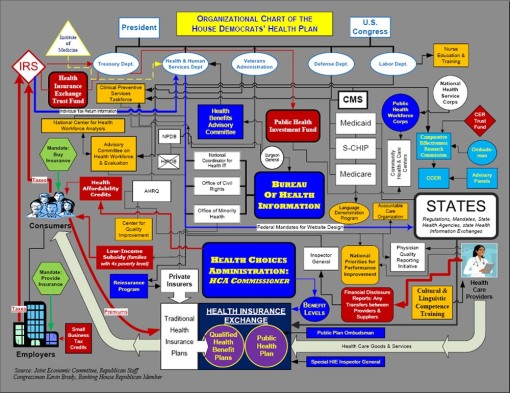Some fundamental questions about the nature of the democratic process have revealed themselves over the course of the healthcare debate. For example, how does one reform the system, as President Obama wishes to do, while still telling people that they can maintain the medical and insurance networks that they have now? Or, why are lawmakers holding town hall meetings now to receive either affirmation or criticism from the public—after the key decisions have already been made?
Or, why is a group of senators that represents 3 percent of the population crafting 20 percent of the healthcare bill? That is the question The Washington Post addressed last week in looking at the Gang of Six on the Senate Finance Committee—Max Baucus (Mont.), Charles Grassley (Iowa), Kent Conrad (N.D.), Olympia Snowe (Maine), Jeff Bingaman (N.M.), and Mike Enzi (Wyo.)—who are tasked with finding a way to pay for the new system. The potential problem is that these folks—while attempting to inject moderation between coastal liberals who yearn for a single-payer system and southern conservatives who seem perfectly satisfied with the status quo—really have the interests of a totally unrepresentative sample of the American public in mind.
Is this fair?

Let’s have a little history lesson here. James Madison, who drafted the Virginia Plan prior to the Constitutional Convention as a broad outline of an effective national government, wanted to limit the influence of states on the types of responsibilities that would fall to the federal government in three ways: 1). He wanted the House of Representatives to elect senators (a “dilution” to pick the wise and stable men who would act as a check on the tumultuous lower chamber). This was scrapped relatively early and relatively unanimously by people who thought that—our republic representing both the people and the states—the state legislatures should be the most appropriate electors of senators.
2.) He wanted a federal veto on state laws that, by either being bad or volatile or just plain improper, would be overridden by the national government. He more or less got this, though not explicitly, in the form of the supremacy clause and the fact that federal courts can declare state laws as violating federal statutes.
3.) Madison wanted proportional representation in both houses of Congress. This was crucial, and it took him several weeks of vocal opposition to come to terms with the fact that this would not happen. Small states threatened to walk out and one delegate from Delaware took Madison aside to tell him that if small states could not have their interests represented equally in at least one chamber, they would have to find comfort in foreign hands. A counter-proposal by the small states called the New Jersey Plan was never seriously considered (even small states recognized that the national government needed to be stronger; consequently the only real difference between the two plans was a unicameral vs. bicameral legislature), but it was leverage the smaller states used to make their concerns heard.
It’s not that Madison did not respect the concern about a “tyranny of the majority.” He just felt that small states’ fears were misplaced. He asked, what could Pennsylvania, Massachusetts, and Virginia possibly have in common that would cause them to ally against the smaller states? In his mind, divisions would be regional—North v. South. That was where differences in economy, lifestyle, ethnicity, and, of course, slavery would arise. Naturally, he was correct.
Fast forwarding one hundred years or so, we can thank the composition of the Senate, for better or for worse, for the shape the nation began to take. As Manifest Destiny took hold in the 19th century, our continent was still inhabited by the French, Spanish, and British. What was to keep American settlers loyal as they headed west, far from the seat of the federal government—or any government for that matter? It was the incentive that they would receive outsize influence in the Senate should they decide to apply for statehood once the population reached a sufficient size.
The bottom line is that the way the Senate is structured is the same double-edged sword that the Founders anticipated. Is it fair now? No. Was it fair then? No. Has the Senate augmented its own importance and magnified its own dysfunctions since 1789? Absolutely. Is there a fix? Only if small state senators use their disproportionate power for the greater good—that is to say, they realize that they are the beneficiaries of a two hundred year old compromise and cannot fairly impose the beliefs of a small minority on the majority.



